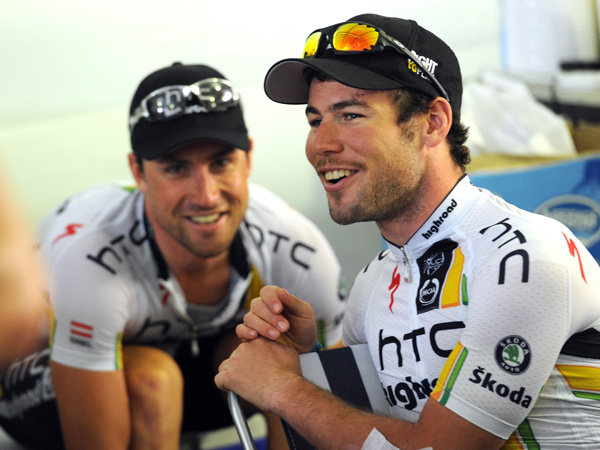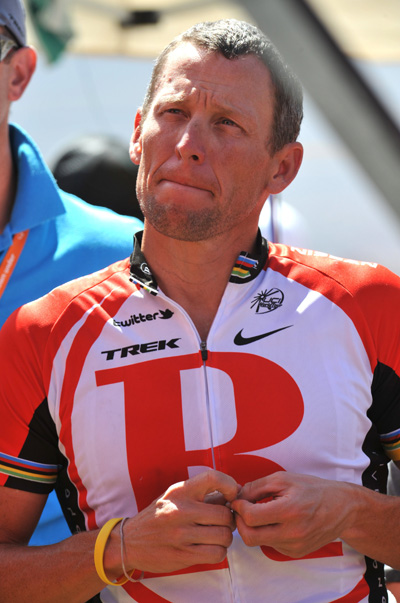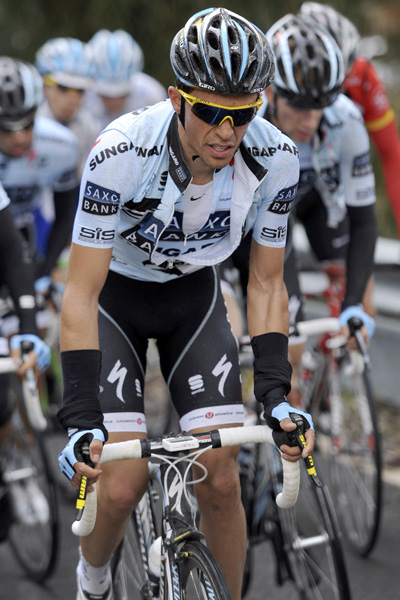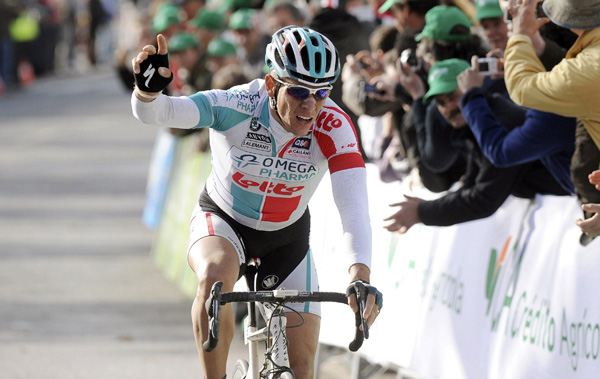What we've learned so far in 2011

The 2011 season is a month old today. So, what have we learned so far?
Words by Lionel Birnie
Assessing the sprinters on the basis of races in January and February is pointless
People were naturally excited when they saw the line-up for the Tour Down Under would pitch Mark Cavendish and Andre Greipel against each other for the first time. Their relationship at HTC was uneasy, to say the least, so the opportunity to see them go head-to-head on opposing teams was fascinating. Throw Tyler Farrar into the mix and it looked good, on paper at least.
Let’s face it, we all got carried away. We’ll have to wait until later in the season for a proper sort-out.
Greipel took two second places but Farrar’s best result in Adelaide was 14th. Cavendish crashed and didn’t sprint all week. Instead, his HTC team-mate Matt Goss contested the finishes and did very well for himself.
And although Farrar is off the mark and Cavendish has dipped his toe in the water by having a go at the Tour of Oman, we’re not learning anything new.
The latest race content, interviews, features, reviews and expert buying guides, direct to your inbox!
Does anyone think the hierarchy has changed? For now, all you need to know about sprinting is contained in a few seconds of footage from the finish on the Champs-Elysees during last year’s Tour (see 6:30 on the clip onwards). The time to make judgements is when the big races come along.
Geox have got an awful jersey, a weak line-up and a patchy race programme
Denis Menchov and Carlos Sastre must have thought that, together, they give the Geox team the guarantee of a place in the Tour de France. After all, Sastre is the only former winner from the past decade or so to have evaded any sort of doping controversy. Menchov was third overall last year. But no. They will not be on the start line in July.
Take a look at the rest of the team, though, and it’s the equivalent of watching a ball of tumbleweed blow across the road during a particularly dull stage of the Vuelta a Espana. A collection of nearly-men and never-weres, plus Juan Jose Cobo and Mauro Gianetti’s son, Noe, make up the roster. Admittedly, Geox has invested heavily in youth – nice, cheap youth – with 12 of the 23 riders under the age of 25.
A quick look at the team’s programme and the number of times the words ‘subject to wild card’ appears shows that there are few organisers who are wildly excited by the prospect of Geox filling their field. That is probably because without Menchov and Sastre there’s nothing to get wildly excited about. And Menchov and Sastre can’t do everything.
And the jersey – though an improvement on last year’s we’ve-been-trodden-on-by-a-giant-while-we-slept-nude look – is awful.

Lance Armstrong may have retired but the PR war goes on
It wasn’t a glorious farewell, just a quick wave to the crowd in Adelaide and an interview with Associated Press to confirm that’s all folks.
Any suggestion that Armstrong would ride the Tour of California was ended. That’s it. This time he’s gone for good.
But that hasn’t stopped the stories appearing in the press. Last week ‘a lawyer familiar with the matter’ suggested to a news agency that Jeff Novitzky had hit a brick wall and that the investigation into doping allegations at the US Postal Service team had faltered.
But let’s think for a moment who ‘a lawyer familiar with the matter’ could be. It certainly won’t be anyone working for the Food and Drug Administration. It’s very unlikely to be anyone working for one of the numerous people said to have corroborated Floyd Landis’s story. So that leaves us to conclude that ‘a lawyer familiar with the matter’ may also be ‘a lawyer working for Lance Armstrong’.
National federations should not be involved in the anti-doping disciplinary process
The Alberto Contador case has been a shambles from the beginning. Why was there a delay between his sample being declared positive by the lab and the UCI making an announcement for example? (Apart from the fact a German media outlet had cottoned onto it). But the latest twist – one that Contador declares as a great step forward for the sport – proves one thing. National federations should not have anyhing to do with rules on anti-doping matters. It’s a conflict of interests, plain and simple.
Sport has always played a role in boosting a nation’s profile abroad as well as bolstering patriotic feeling at home. And if a country’s people feel good about themselves, it’s likely they’ll feel broadly supportive of their Government too. So it was hardly surprising to see the Spanish prime minister Jose Luis Rodriguez Zapatero backing Contador.

What we don’t know, is whether the Spanish Cycling Federation [Real Federación de Ciclism] came under political pressure to clear Contador.
On the other hand, we do know that Contador’s defence changed. First it was the meat, then it was an administrative failing by the UCI, which, it is alleged, failed to send Contador certain pieces of paperwork pertaining to the case.
Either way, an appeal by the UCI is likely. Then the Court of Arbitration for Sport will decide – hopefully before the Tour de France starts.
But the longer term implications of this must be for WADA [the World Anti-Doping Agency] to set up a completely independent, cross-border disciplinary panel and procedure that cannot possibly be laid open to accusations of national bias.
It’s very difficult to tell Sky, Garmin and Leopard apart on the telly
When the peloton is in full flight and the riders have their hands on the drops, they all look the same, with their black shoulders and their flashes of white and blue. Unless the camera gets close Sky’s three white stripes look similar to Garmin’s big é. Leopard and Garmin both have pale blue bands round the shorts. And so we’re left to scan the screen for clues that Inspector Cluseau might miss. Here’s what we have spotted so far. Sky’s riders have the black Kask helmets and pale blue mitts. Garmin’s helmets are silver but from a distance they look very similar to Leopard’s pale blue and white. Oh, forget it. We give up.
HTC keep finding young riders – but may have a fight on their hands to be top dogs
The latest on the relentless HTC production line of young stars is John Degenkolb. The German impressed at the under-23 World Championships a couple of years back, and grabbed his first pro win at the Tour of the Algarve yesterday.
One thing HTC are good at is winning races. They’ve lost Greipel to Omega Pharma, Cavendish will focus on fewer but more important goals, yet the team will still be favourites to win more races than anyone else this year.
Having said that, they may well face stiffer competition this year. Garmin-Cervélo have hit the ground running, with wins in Australia, Mallorca and Qatar so far.
Philippe Gilbert is looking good already
It’s Het Nieuwsblad next weekend, so the Belgian chose the Tour of the Algarve as the place to open his account for the season, taking the opening stage on Tuesday with a superb attack in the final kilometre. However, it’s still six weeks until the ‘proper’ Classics start. He needs to be careful he doesn’t show his hand too early. Or maybe there's still room for improvement. That would be frightening.

Follow us on Twitter: www.twitter.com/cyclesportmag
Edward Pickering is a writer and journalist, editor of Pro Cycling and previous deputy editor of Cycle Sport. As well as contributing to Cycling Weekly, he has also written for the likes of the New York Times. His book, The Race Against Time, saw him shortlisted for Best New Writer at the British Sports Book Awards. A self-confessed 'fair weather cyclist', Pickering also enjoys running.